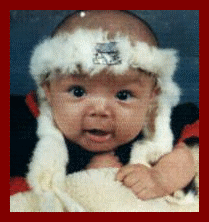

INUIT CHILD REARING
In traditional Inuit households, children were treated with patience and gentleness, and in response, children were seldom unruly. Slapping and scolding were not regarded as acceptable forms of child control. Proper behaviour though, was achieved through other means.The Inuit considered generosity, mildness and gentleness to be very good traits. Since their society relied on the co-operative effort of all its members,these traits became indispensable. Losing one's temper, on the other hand, was considered disgraceful. Moreover, a rash angry act could threaten the well-being of the community.Children developed certain traits through a subtle process of social pressure. Negative qualities such as petulance were ridiculed while positive traits such as unselfishness were rewarded. One of the most severe forms of punishment was withdrawal of affection. In a society that relied heavily on members' co-operation, there was nothing more life-threatening than isolation. A child was never denied a wish, although an adult would try to modify a child's unreasonable request. A small child would be allowed to play with a very sharp knife,but quickly someone would distract the infant with affection and offer a substitute for the knife. In other circumstances experience was considered the best teacher.Older children,for example, quickly learned that knives were sharp:one good nick usually taught them to be careful.
Thank you to the Government of Canada ( Indian and Northern Affairs) for this information.
Back to Home Page
Inuit Baby picture courtesy of Kihew-This is not a baby picture of Eric Schweig
Caribou courtesy of Joni
(Copyright İRose-99)